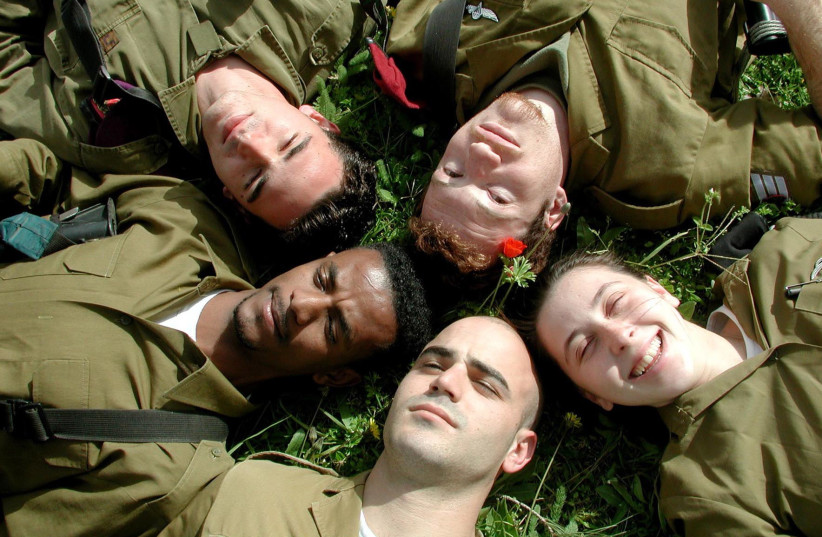Israel is not a racist country – but too many of its citizens are intolerant of the other. It’s not just a matter of Jews against Muslims or Christians, or white against black, or secular against ultra-Orthodox, or ultra-Orthodox extremists against women, or Ashkenazim against Sephardim or people of North African descent. It’s simply a refusal to recognize that we are all cut from the same cloth, regardless of our faith or the color of our skin.
Even Golda Meir said of the Black Panthers who are of North African background – mostly Moroccan – “they are not nice people.”
Tolerance of the other is perhaps best expressed in hospitals, where few if any patients object to being treated by doctors and nurses of another faith or national or ethnic background.
The same goes for public transport where people of every stripe sit and stand alongside each other. But there are also unfortunate exceptions.
One of the most obvious, only because it receives so much publicity, is the refusal by Jerusalem Beitar soccer fans to accept Arab or Muslim players. Most vocal in this regard are the members of La Familia, which can be characterized as a group of racist thugs. Less obvious are the attempts by the Interior Ministry to deport non-Jewish widows and divorcees of Israeli citizens. They are often sent out of the country with their Israeli-born children, who are citizens, but who cannot be left alone.

There are Christians in the country who suffer religious intolerance. This is brought up annually by Greek Patriarch Theophilos III at the traditional pre-Christmas reception hosted by President Isaac Herzog and his predecessors. Most recently, Nikodemus Schnabel, the abbot of the Dormition Abbey on Mount Zion, last week escorted Bettina Stark-Watziger, Germany’s Education and Research minister, when she visited the Western Wall.
Although he did not enter the prayer section, he was asked by a guide from the Western Wall Heritage Foundation to conceal his crucifix, because to wear it at this particular holy site, he was told, was a mark of disrespect. This was a humiliating experience for Schnabel. The scene was witnessed and filmed by a reporter for Der Spiegel, who posted it online. This almost led to a diplomatic incident, with a strong protest from Berlin.
In Tel Aviv, more than in other parts of the country, there is discrimination against Israelis of Ethiopian background, who are mistaken for asylum seekers. In either case, those who are employed – even in fields such as high tech – are paid much lower wages than people without African features or complexions.
When are Africans embraced in Israel? When they score high points in sports. One example is Blessing Afrifa, a 200 meters gold medallist at the World Athletics U20 Championships in 2022 and the European Athletics U23 Championships in 2023. Born and raised in Israel to parents from Guinea. Afrifa, 19, went to school in Israel and all his friends are Israelis.
Although his parents evaded deportation, all attempts to acquire citizenship failed until it was realized that unless he was granted citizenship, Afrifa could not compete for Israel. A rare exception was made when he was 16, and he dreams of representing Israel at the Olympics.
His story is reminiscent of the 1970s and 1980s when Afro-American basketball players were brought to Israel to join major teams and to also play for the national team. They were given quickie conversions to Judaism and Israeli citizenship.
Jews around the world will be marking Tisha Be’av this week and will be reminded that the First and Second Temples were destroyed as a punishment for baseless hatred. In Israel’s present social climate, this is an extremely important lesson to take to heart.
Beit Avi Chai developing content for broad Israeli audience
Apropos Tisha Be’av, Jerusalem’s Beit Avi Chai is a magnet on this day for both secular and religious Jews. For several years now, Beit Avi Chai has been screening films on Tisha Be’av that directly and indirectly convey the message of the damage that intolerance and misunderstanding can do.
Since its founding in 2007, Beit Avi Chai’s focus has been on creating and developing original Jewish content aimed at introducing diverse audiences to Jewish-Israeli culture, which is sometimes quite different to Jewish culture in Diaspora communities, because culture is after all related to the environment in which it finds expression.
Building on its success with Hebrew and English-speaking audiences, Beit Avi Chai, which under the direction of David Rozenson, runs approximately 50 diverse programs each week, has also opened a Russian language department that employs many experienced educators from Russia, Ukraine, and other parts of the former Soviet Union.
It has also expanded its work with the IDF’s educational department through online and in-person programs. Moreover, it also holds events in Beersheba, Ra’anana, Petah Tikvah, Haifa, and Tel Aviv – a factor that requires incredible logistics, but is also proof of the thirst for culture by people all over the country. There’s only one tiny drawback. Tickets can no longer be purchased in cash. They can only be acquired online, which makes life difficult for people who are not tech-proficient, or who in an era of hackers, are reluctant to use their credit cards online.
It would be helpful if there was a uniform card similar to that used on public transport which could be used at numerous cultural outlets such as museums, theaters, concert halls, and cinemas. That would also enable the realization of last-minute decisions to attend.
Ariel University dismisses senior vice president for Resource Development and External Affairs
Since its original inception as an academic college in 1982, Ariel University, which is located across the Green Line, has been a subject of controversy, regardless of the fact that it accepts Palestinian students. But its most recent imbroglio is not related to its geography but to the dismissal of its senior vice president for Resource Development and External Affairs Bobby Brown, who was primarily responsible for fundraising through the university’s international network of friends.
Brown, who was appointed three-and-a-half years ago, is but one of several people who were dismissed, left of their own accord, or who were somehow ousted from office.
Brown came to Ariel with a record of distinguished service including as a combat medic in the IDF. He was also diaspora affairs adviser to the prime minister and worked in various capacities at the World Zionist Organization and the Jewish Agency.
In addition, he sat on the boards of Yad Vashem, El Al, the Jewish National Fund, the Gush Etzion Development Corporation, and the Israel Community Development Foundation, raising (among other feats) approximately $4.5 million annually for humanitarian services for communities in Judea and Samaria. He was one of the founders of the Tekoa settlement where he made his home.
The powers that be at Ariel were not satisfied with his having raised in the vicinity of $10 million and failed to take into account that philanthropy suffered a severe downturn during the COVID pandemic.
Though dismissal is never a pleasant experience, it may turn out that Ariel’s loss will be some other institution’s gain and that Brown will be snapped up with open arms by an enterprise looking for someone just like him.
MDA vs. United Hatzalah
Why should there be competition in saving lives and helping to heal the sick? Why does Magen David Adom, Israel’s equivalent to the Red Cross seek to eliminate the United Hatzalah Emergency Medical Service, instead of holding out the hand of partnership and cooperation?

At ground level there is cooperation. When MDA and United Hatzalah paramedics arrive at almost the same time to deal with someone who has suffered cardiac arrest, they work together to restore a pulse and a heartbeat. But at a higher level, MDA sees UH as its nemesis – or perhaps it’s the other way around. United Hatzalah does not want to get rid of MDA, it just wants to expand its own network of volunteers and services.
Part of the problem is that UH keeps MDA on its toes. Any progress made by UH must be immediately emulated by MDA. That costs effort, time, and money. So how can MDA get rid of UH? A first step would be to deprive UH of its emergency four-digit phone number.
The logic behind that is that if UH doesn’t get emergency calls, there’s no reason for its first responders to stay with the organization. MDA has twice gone to court to have the number canceled. It has failed both times – most recently last week. when the High Court of Justice rejected the MDA petition to cancel the number.
United Hatzalah CEO Eli Pollack welcomed the decision of the High Court saying that it recognized the importance of the organization’s activities and how essential it was to maintain the four-digit emergency number which is available 24/7 every day of the year. UH will continue to provide emergency medical services free of charge, he said.
Flights to Cyprus
APG Israel which is part of the Maman Group, specializing in the representation and marketing of airline companies, has announced that Cyprus Airways, the national airline of Cyprus, has chosen APG to manage its service and sales system (GSA) with travel agents, travel wholesalers, and Israeli passengers.
According to Maman CEO Ofer Reinhardt: “We are delighted with the choice of Cyprus Airways. I do not doubt that the GSA agreement is a significant step in strengthening Cyprus Airways’ connection to the Israeli market and will enable us to offer travel agents and customers the best slots between Tel Aviv and Larnaca.”
Paul Sies, CEO of Cyprus Airways, said: “We are confident that APG Israel will upgrade service to Cyprus. Their success in the GSA field for airlines and their experience, knowledge, and long-standing expertise in handling tour organizers and travel agents will help us provide better service to the Israeli public.”
greerfc@gmail.com
